Day two -
the Plenary sessions start -
Tuesday 22nd June 1999
The launch
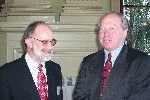 The
WAPC conference began with an informal gathering and that grand old English
tradition, a cup of tea. Despite an official opening by the Premier of Queensland
Peter Beattie, seen right with Prof Pearce, very few members of the media
were there to cover the event.
The
WAPC conference began with an informal gathering and that grand old English
tradition, a cup of tea. Despite an official opening by the Premier of Queensland
Peter Beattie, seen right with Prof Pearce, very few members of the media
were there to cover the event.
 Prof
Pearce was joined by Beattie, Justice Sawant (President of the WAPC) and
Prof David Flint (Chairman of the Australian Broadcasting Authority) at the
main table.
Prof
Pearce was joined by Beattie, Justice Sawant (President of the WAPC) and
Prof David Flint (Chairman of the Australian Broadcasting Authority) at the
main table.
Prof Dennis Pearce, Chairman of the Australian Press Council, opened the
forum by telling the
 delegates
that Australians are an informal people but despite reports to the contrary
they were a hard working people and the conference reflected this with a
lot to be covered in the four plenary sessions being run over two days.
delegates
that Australians are an informal people but despite reports to the contrary
they were a hard working people and the conference reflected this with a
lot to be covered in the four plenary sessions being run over two days.
Pearce talked about accountability and responsibility in the media two areas
that the press and press councils had to watch carefully. He said that the
councils should expect and hope for a diversity of viewpoints in the press.
 Premier
Peter Beattie
Premier
Peter Beattie
Beattie spent much of the launch talking about the beautiful Queensland weather
- and it was a beautiful day with the sun shining.
He went on to talk about the "interesting relationship that politicians have
with the media. He knocked over a microphone and jibed, "Here I am knocking
them over already..."
He talked about how cynical modern society was getting with the media with
growing concern in communities about what they read.
 "Politicians
have an agenda... however conflict is far more likely to be reported than
more serious issues like job creation."
"Politicians
have an agenda... however conflict is far more likely to be reported than
more serious issues like job creation."
Beattie then went on to talk of the power of the Internet saying that "government
can no longer control the flow of information any more".
He said that the conference would deal with checks and balances in the mainstream
media - but what about checks and balances on the Internet? He made his point
by referring to a Gun lobby site on the Internet.
"There is a particular individual here who took photographs of my house this
morning to put on the Internet," Beattie said. Talking about Ron Owen but
implying, incorrectly, that Owen was present in the room. He referred to
the intimidation when referring to the Gun Lobby's
House
and Garden website competition web site.
As Beattie left the hall I walked up to him and said, "Who was it here today
who put pictures of MPs houses on the net?"
Beattie replied, "I didn't say that it was someone here. It was Ron Web."
I said, "You mean Ron Owen?"
Beattie, "Sorry, yes." walking off.
Prof Pearce said to me "Not here, Scott, not now." I felt the implication
of Beattie's comments about the individual being "here" would have created
the perception that I was the individual involved - as I was taking photographs,
was involved with pro-gun lobby group One Nation and worked on the net. Of
course I am not Ron Owen and have never supplied him or his web site with
any images.
Pearce was later to admit that my concerns had been justified.
The whole issue was dealt with very discreetly with none of the delegates
realising what we discussed.
 Prof
David Flint
Prof
David Flint
Prof Flint holds many hats. One of them is as the Executive Council Chairman
of the WAPC. He is an ex-Chairman of the Australian Press Council (APC).
Flint talked about the importance of press freedom, its responsibility and
accountability.
He talked about the new Internet legislation not being used to curtail freedom
of speech.
He quoted Oscar Wilde, "The thing to be concerned about is not when people
are talking about you but when they are not talking about you."
 The
keynote speech: Prof John Hennington
The
keynote speech: Prof John Hennington
Hennington is the professor of journalism at the University of Queensland.
In summary he reminded delegates to look at what was coming to the media
in the future.
He made the point that the coverage of negative issues, especially political,
demonstrated press freedom. Looking at the past he said that the earliest
papers did little more than express the opinion of the proprietor. (I
personally think very little has changed in this regard).
He talked about the overall decline in newspaper sales in australia from
4 million a day to about 2.5 million per day - in just the last two decades.
He referred to the web and the danger that it is now presenting to the
traditional media in Australia.
He questioned the function of writing in the new world where we were all
caught up in television, sound and imagery and referred to the integration
of the print media onto the Internet.
He claimed that a simple survival strategy for newspapers was to maintain
an ethical code of practise - saying that any transgressions reflected poorly
on the whole industry.
He lamented that the press had shown very little interest in Universities
which taught true "ethical" journalism.
Plenary Session One: Reporting of conflicts (civil, religious, ethnic):
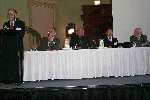 The
session was introduced by Prof Dennis Pearce. Those speaking included (seated
left to right in the image right): Dr Haluk Sahin (Turkish Press Council)
who chaired the session; Whai Ngata (General Manager, Maori programmes,
Television New Zealand); Francis Lee (head of the Cantonese group for the
SBS and chairman of the Asian Media Council of Australia); and Peter Cole-Adams
the Sydney Morning Herald's foreign correspondent.
The
session was introduced by Prof Dennis Pearce. Those speaking included (seated
left to right in the image right): Dr Haluk Sahin (Turkish Press Council)
who chaired the session; Whai Ngata (General Manager, Maori programmes,
Television New Zealand); Francis Lee (head of the Cantonese group for the
SBS and chairman of the Asian Media Council of Australia); and Peter Cole-Adams
the Sydney Morning Herald's foreign correspondent.
Dr Haluk Sahin:
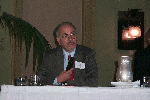 Sahin
said that the days when countries sent their war correspondents to cover
conflict in wars that they were involved in are gone.
Sahin
said that the days when countries sent their war correspondents to cover
conflict in wars that they were involved in are gone.
Today, in the global village, journalists- many freelance, converge on the
country facing wars or conflict even if their country is not involved in
the war.
They are able to go to places where troops dare not.
Whai Ngata
 Ngata
talked about the manner in which two sides of a conflict appear to be wrapped
up in their own self-righteousness.
Ngata
talked about the manner in which two sides of a conflict appear to be wrapped
up in their own self-righteousness.
He talked about the unemployment levels in the 1960s in New Zealand leading
to the raids on community groups like those from Tonga - and the media coverage
causing racial friction at that time.
He talked about the need of the media to understand the culture of a people
- and that this could only be done properly by people from that community
group reporting on it. He talked about the manner in which laws had
covertly taken land away from the Maori people. He was scathing about the
legal profession referring to a case where 16 lawyers had represented two
sides over an argument about the word "tribe" in a case between two Maori
groups.
"The white media were not able to accurately report on Maori concerns," he
said.
Ngata expressed concerns about the bias now in the Maori media - "you are
an activist if you don't agree with me but a community leader if you do",
he said.
 Francis
Lee:
Francis
Lee:
Lee talked about the four Chinese daily papers soon to be joined by a fifth.
He said that media interest had come out of two developments in Australia.
-
The large influx of Chinese nationals since the 1980s and
-
Hawke's decision to allow 10,000 Chinese to stay in Australia during the
Tienenamen massacre.
He said that Prof Blainey's comments about the Asianisation of Australia
in 1984 had caused the Chinese people to become more politically oriented
than they had been before.
 He
said that he agreed with many of One Nation's policies but that Chinese were
scared of expressing support in the party.
He
said that he agreed with many of One Nation's policies but that Chinese were
scared of expressing support in the party.
He referred to the exploitation of anti-racist feelings by some candidates
who wanted to push their own barrow.
He said that there is no such thing as an ethnic vote in the Chinese community
saying that only under certain circumstances - citing the time Howard would
not distance himself from One Nation as an example - that the voters would
vote as a group.
He talked about the uncompromising attitude of many Asians towards their
own homeland policies and viewpoints. He said that these differences within
the Asian community appear to be being reconciled now with different groups
getting together.
He talked of how the same Chinese faces would be seen at a Liberal Party
meeting one night and a Labor Party meeting the next...
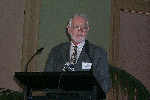 Peter
Cole-Adams
Peter
Cole-Adams
I am afraid I didn't get much of Cole-Adam's speech.
Groups:
After the speeches groups were formed and informal discussion followed about
the issues raised.
I joined Francis Lee's groups. The issue of political correctness and what
to report and what not to report being a common concern among those in the
group.
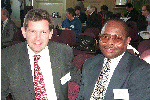 Lunch
break:
Lunch
break:
I joined Dr Levi Obijiofor, a lecturer at the Department of Journalism at
the University of Queensland during the lunch break. We compared notes over
our experiences of Africa.
Levi coming from Nigeria and I being born in Tanzania.
Second Plenary Session: Reporting on private tragedy and grief:
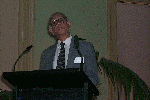
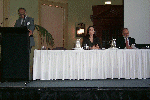 This
session was chaired by Dr PVJ Jayasekera the Chairman of the Sri Lanka Press
Council with speakers being Miranda Devine a columnist from the Daily Telegraph
in Sydney and Prof Dennis Pearce replacing Sabam Siagian who could not
attend.
This
session was chaired by Dr PVJ Jayasekera the Chairman of the Sri Lanka Press
Council with speakers being Miranda Devine a columnist from the Daily Telegraph
in Sydney and Prof Dennis Pearce replacing Sabam Siagian who could not
attend.
Miranda Devine:
Devine spoke of Immigration Minister Philip Ruddock's recent intervention
stopping Australian journalists access to Albanian refugees from Kosovo.
 She
was very outspoken in her view that the "death knock" (visiting the home
of a family where a tragedy had taken place) was a great form of relief for
the family involved and brought community sympathy back to those who were
grieving a loss.
She
was very outspoken in her view that the "death knock" (visiting the home
of a family where a tragedy had taken place) was a great form of relief for
the family involved and brought community sympathy back to those who were
grieving a loss.
 Her
comment in no way reflected those made in May this year by a
victim of crime,
Elaine Southgate, at a University of Queensland Forum (School
of Journalism) that I attended.
Her
comment in no way reflected those made in May this year by a
victim of crime,
Elaine Southgate, at a University of Queensland Forum (School
of Journalism) that I attended.
Devine claimed that democracy was healthiest when the public is informed.
She used the death of Walter Micack's family at Port Arthur - and how his
media-based lobbying led the assault to have semi-automatic guns banned.
Dennis Pearce:
Prof Pearce apologised for not being fully prepared as he had stood in on
behalf of the other speaker who could not make it at the last moment.
He asked several questions like "Should there be different standards for
different publication?"
Final session after tea break:

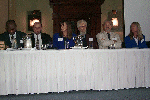 The final session was without doubt the most
controversial.
The final session was without doubt the most
controversial.
It was opened by Prof HP Lee (seen right).
Amongst the speakers talking about their papers were:
Left to right (image left): Dr Levi Obijiofor; Lawrence McNamara (University
of Western Sydney); Dr Neil Mudge and Nicole d'Entremont (University of Southern
Queensland -
which
has banned One Nation from its campus); David Robie (University of
the South Pacific); Trevor Cullen (Queensland University) and Anne Day
(University of Queensland).
The speeches looked at how papers were defined and will not, except for some
outrageous claims by McNamara not be covered here.
 Lawrence
McNamara:
Lawrence
McNamara:
McNamara's talk was entitled "One Nation, the media and the illusion of
free speech".
McNamara laboured on the point that One Nation's argument against being "racist"
was "How can I be racist when I want all people to be treated equally?"
he then raised a number of scurrilous claims and arguments with the one that
topped it for me was, quote:
"If you are an ordinary Australian you are not an Aboriginal and you
are not from the ethnic community....."
He then went on to say how racist politics was aimed at marginalising certain
racial groups.
After he had finished his diatribe I was furious. When all speakers had finished
I confronted McNamara over his claims taking issue over the statement highlighted
above.
I asked how such a claim could be made about a party which had an
Aboriginal and an ethnic
person as candidates in the recent New South Wales state election...
(Hussein Abou-Ghaida and Jack Manasserian) of course there was no reply from
the learned academic.
The session closed at 6pm and we all went across to the
Marriott Hotel for dinner.
 The
WAPC conference began with an informal gathering and that grand old English
tradition, a cup of tea. Despite an official opening by the Premier of Queensland
Peter Beattie, seen right with Prof Pearce, very few members of the media
were there to cover the event.
The
WAPC conference began with an informal gathering and that grand old English
tradition, a cup of tea. Despite an official opening by the Premier of Queensland
Peter Beattie, seen right with Prof Pearce, very few members of the media
were there to cover the event.


 Premier
Peter Beattie
Premier
Peter Beattie

 Prof
David Flint
Prof
David Flint
 The
keynote speech: Prof John Hennington
The
keynote speech: Prof John Hennington



 Francis
Lee:
Francis
Lee:

 Peter
Cole-Adams
Peter
Cole-Adams
 Lunch
break:
Lunch
break:






 Lawrence
McNamara:
Lawrence
McNamara: